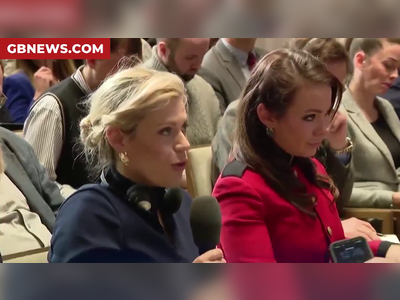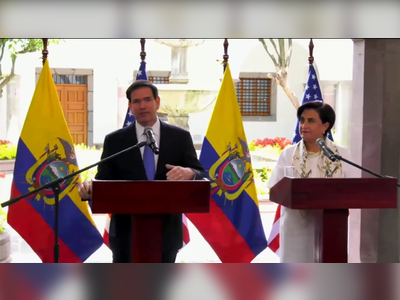Katalin Novák Fails, Yet May Receive a Lifetime Monthly Allowance of 4.5 Million Hungarian Forints
Katalin Novák resigned from her position as the President of Hungary on Saturday.
However, until the National Assembly formally accepts her resignation, she remains the President with full authority. According to the law on the legal status and compensation of the President, she must submit a written statement to the Parliament declaring her resignation. For the resignation to be valid, it requires an accepting statement from the National Assembly. The Parliament, however, can request within 15 days for the President to reconsider her resignation, but if she upholds her decision in a written statement, the Parliament is obliged to accept it. The President's mandate then ends at the date specified in the resignation statement, which cannot be earlier than the 15th day following. If no date is specified, the mandate ends on the day Parliament accepts her resignation.
Given that it is unlikely for the government majority to ask Novák to stay, and she did not specify a date for her resignation in her speech, her presidency is expected to end on the day the Parliament agrees to her resignation. The National Assembly's spring session begins on February 26, and since there has not been a proposal for an extraordinary session, Novák's mandate is anticipated to terminate towards the end of February or the beginning of March, dependent on a parliamentary decision.
As a former head of state, Novák is entitled to a monetary allowance equivalent to the monthly honorary salary of the incumbent President for the rest of her life, which is considered a non-independent income. Currently, this monthly sum amounts to 4.5 million Hungarian forints before taxes. She will lose this benefit if she takes up employment, qualifying as assured under social insurance benefits which includes income from activities beyond those protected by copyright such as parliamentary or other governmental, public duties. Additionally, upon request, the former President receives the right to adequate housing provided and maintained by the Presidential Office, personal car use with a vehicle and driver supplied by the police, and a two-person secretariat provided by the government. Furthermore, she also has access to free healthcare.
According to the Fundamental Law, if the President's term ends prematurely, the election of a new President must occur within 30 days of the cessation. Schmitt Pál, who resigned amid a plagiarism scandal on April 2, 2012, was promptly succeeded by his acceptance of resignation by the Parliament on the same day, avoiding the "dead time" inevitable in Novák's case. Schmitt's successor, János Áder, became the official candidate of the governing party on April 16, 2012, was elected President on May 2, and took office 8 days later, on May 10. Therefore, should Novák's mandate end at the close of February or the start of March, her successor must be elected by the end of March or early April.
The new President takes office on the eighth day after the announcement of the election results, following the swearing-in before the National Assembly. Thus, without accounting for a special parliamentary session in February, Hungary could have a new President around Easter, March 31, at the earliest.
The President of the Republic is elected by the National Assembly for a term of five years; any Hungarian citizen who has reached the age of 35 is eligible. The President of the National Assembly sets the election date, which differs from the pre-2012 three-round voting, being a two-round process. In the first round of the secret ballot, the votes of two-thirds of all representatives are required. If this is not achieved, a second round must be held where the two candidates with the most votes proceed, with a simple majority sufficing for election. Nominations precede voting, requiring the written endorsement of at least one-fifth of the members of the National Assembly for a candidate to be nominated. Each MP can nominate one candidate. With Fidesz-KDNP holding a two-thirds majority, it is likely that Novák's successor will be elected in a single round of voting, with the identity of the candidate still uncertain.
According to the law, in the event the President's mandate ends, the duties and powers of the President will be performed by the Speaker of the National Assembly until a new President assumes office. In the current case, László Kövér will fulfill this role. During this period, he cannot exercise his rights as a deputy; instead, the tasks of the Speaker of the Parliament are performed by the Deputy Speaker appointed by the National Assembly.
Given that it is unlikely for the government majority to ask Novák to stay, and she did not specify a date for her resignation in her speech, her presidency is expected to end on the day the Parliament agrees to her resignation. The National Assembly's spring session begins on February 26, and since there has not been a proposal for an extraordinary session, Novák's mandate is anticipated to terminate towards the end of February or the beginning of March, dependent on a parliamentary decision.
As a former head of state, Novák is entitled to a monetary allowance equivalent to the monthly honorary salary of the incumbent President for the rest of her life, which is considered a non-independent income. Currently, this monthly sum amounts to 4.5 million Hungarian forints before taxes. She will lose this benefit if she takes up employment, qualifying as assured under social insurance benefits which includes income from activities beyond those protected by copyright such as parliamentary or other governmental, public duties. Additionally, upon request, the former President receives the right to adequate housing provided and maintained by the Presidential Office, personal car use with a vehicle and driver supplied by the police, and a two-person secretariat provided by the government. Furthermore, she also has access to free healthcare.
According to the Fundamental Law, if the President's term ends prematurely, the election of a new President must occur within 30 days of the cessation. Schmitt Pál, who resigned amid a plagiarism scandal on April 2, 2012, was promptly succeeded by his acceptance of resignation by the Parliament on the same day, avoiding the "dead time" inevitable in Novák's case. Schmitt's successor, János Áder, became the official candidate of the governing party on April 16, 2012, was elected President on May 2, and took office 8 days later, on May 10. Therefore, should Novák's mandate end at the close of February or the start of March, her successor must be elected by the end of March or early April.
The new President takes office on the eighth day after the announcement of the election results, following the swearing-in before the National Assembly. Thus, without accounting for a special parliamentary session in February, Hungary could have a new President around Easter, March 31, at the earliest.
The President of the Republic is elected by the National Assembly for a term of five years; any Hungarian citizen who has reached the age of 35 is eligible. The President of the National Assembly sets the election date, which differs from the pre-2012 three-round voting, being a two-round process. In the first round of the secret ballot, the votes of two-thirds of all representatives are required. If this is not achieved, a second round must be held where the two candidates with the most votes proceed, with a simple majority sufficing for election. Nominations precede voting, requiring the written endorsement of at least one-fifth of the members of the National Assembly for a candidate to be nominated. Each MP can nominate one candidate. With Fidesz-KDNP holding a two-thirds majority, it is likely that Novák's successor will be elected in a single round of voting, with the identity of the candidate still uncertain.
According to the law, in the event the President's mandate ends, the duties and powers of the President will be performed by the Speaker of the National Assembly until a new President assumes office. In the current case, László Kövér will fulfill this role. During this period, he cannot exercise his rights as a deputy; instead, the tasks of the Speaker of the Parliament are performed by the Deputy Speaker appointed by the National Assembly.
AI Disclaimer: An advanced artificial intelligence (AI) system generated the content of this page on its own. This innovative technology conducts extensive research from a variety of reliable sources, performs rigorous fact-checking and verification, cleans up and balances biased or manipulated content, and presents a minimal factual summary that is just enough yet essential for you to function as an informed and educated citizen. Please keep in mind, however, that this system is an evolving technology, and as a result, the article may contain accidental inaccuracies or errors. We urge you to help us improve our site by reporting any inaccuracies you find using the "Contact Us" link at the bottom of this page. Your helpful feedback helps us improve our system and deliver more precise content. When you find an article of interest here, please look for the full and extensive coverage of this topic in traditional news sources, as they are written by professional journalists that we try to support, not replace. We appreciate your understanding and assistance.
















